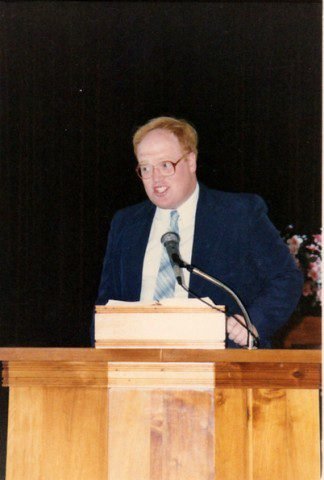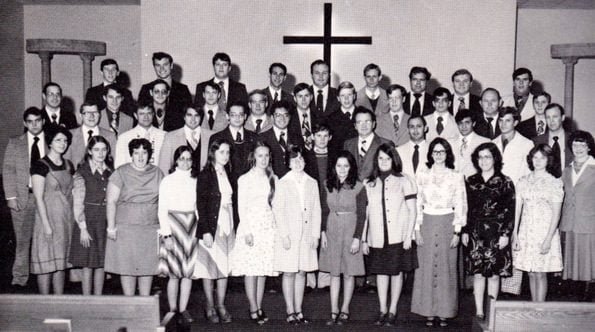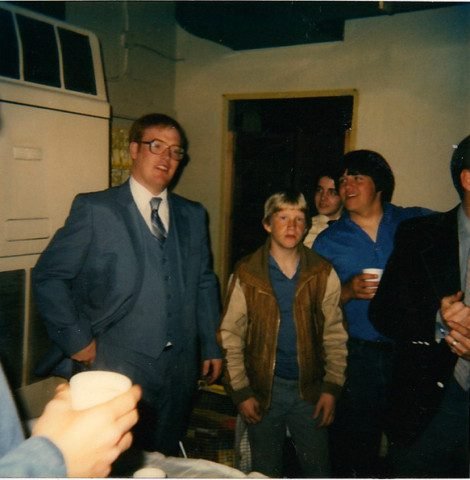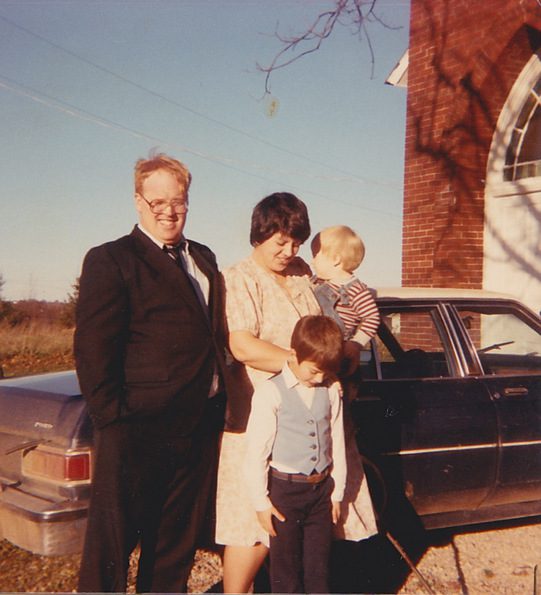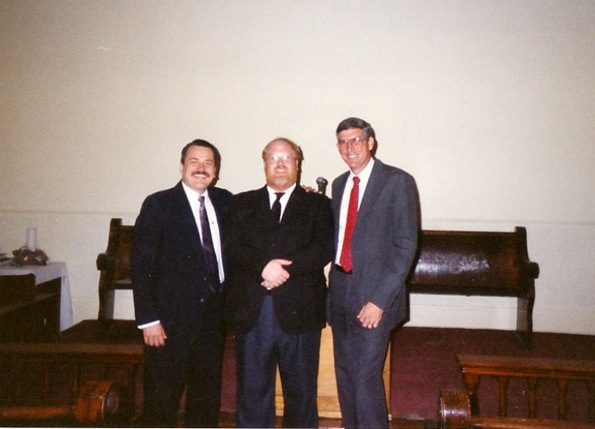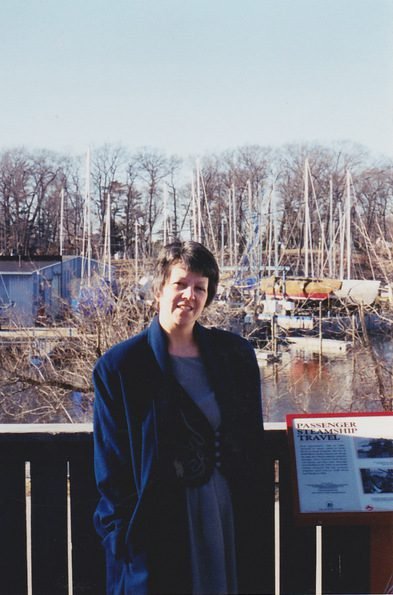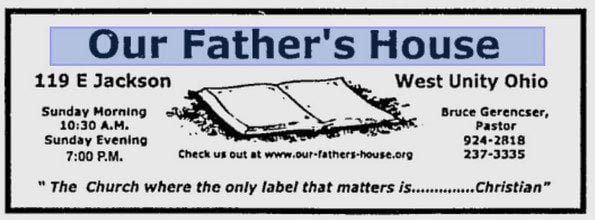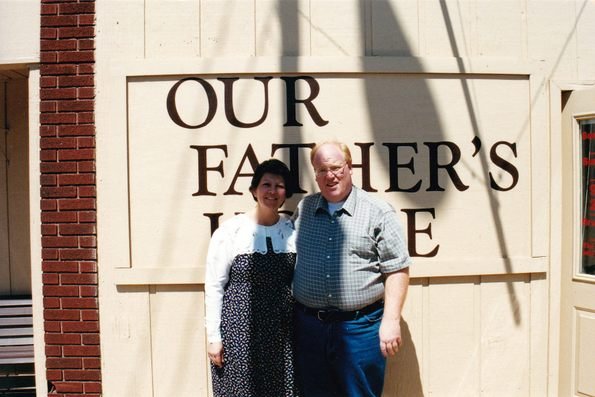
After two short stints pastoring Community Baptist Church in Elmendorf, Texas (1994) and Olive Branch Christian Union Church (1995) in Fayette, Ohio, I started a Sovereign Grace Baptist congregation called Grace Baptist Church in West Unity, Ohio. Several years later, we would change the church’s name to Our Father’s House to better reflect our inclusiveness.
When I started Grace Baptist Church, I was a five-point Calvinist, not much different theologically from my description in part three of this series. I remained a Calvinist until the late 1990s, at which time my theology and political beliefs began lurching leftward. The church changed its name and I began to focus more on inclusivism and good works. During this time, my theology moved from a Calvinistic/Reformed viewpoint to more of a liberal/progressive Mennonite perspective. Much of my preaching focused on the good works every Christian should be doing and the church’s responsibility to minister to the sick, poor, and marginalized.
As my preaching moved leftward, so did my politics. By the time I left Our Father’s House in July of 2002, I no longer politically identified as a Republican. The single biggest change in my beliefs came when I embraced pacifism. The seeds of pacifism were sown years before when the United States immorally attacked Iraq in the first Iraq War. I opposed this war, and as I began reading authors such as Thomas Merton, Dorothy Day, John Howard Yoder, Gandhi, and Eileen Egan, I concluded that all war was immoral.
By the time of the Y2K scare:
- I was preaching inclusivism, encouraging interaction and work with all who claimed the Christian moniker.
- I was preaching a works-centered, lifestyle-oriented gospel. Gone was the emphasis on being “born again” or making a public profession of faith. In particular, I focused on the teachings of Jesus in the Sermon on the Mount.
- I believed the institutional, organized Christian church was hopelessly broken and increasingly indifferent toward the needs of the poor and marginalized.
- I was a committed, vocal pacifist, opposing all war on moral grounds. I remain a pacifist to this day.
In 2003, I pastored Victory Baptist Church — a Southern Baptist congregation in the central Michigan community of Clare — for seven months. Both Polly and I agree that we never should have moved to Clare. It was a wasted seven months (more on that in a future post) that ended with me resigning from the church. This was the last church I pastored.
While I was pastor of Victory Baptist, a friend of mine from Ohio came to visit us. From 1991-1994, he had been a member of the church I pastored in Somerset, Ohio. After listening to me preach, he told me that he was astounded by how much my preaching had changed, how liberal it had become. And he was right. While my preaching was orthodox theologically, my focus had dramatically changed.
In 2004, Polly and I moved to Yuma, Arizona. We lived in Yuma for almost seven months. We then moved to Newark Ohio, where we lived for ten months. In July of 2005, we moved back to the northwest Ohio community of Bryan. In May of 2007, we bought a house in Ney, Ohio where we currently live.
As you can see, we did a lot of moving over four years. We were restless seekers. Every place we lived, we diligently, Sunday after Sunday, Wednesday after Wednesday, visited local churches in hopes of finding a spiritual home. Instead of finding a home, we increasingly became dissatisfied and disillusioned. We concluded that, regardless of the name over the door, churches were pretty much all the same. Dysfunctional, incestuous, focused inward, entertainment/program driven, resembling social clubs far more than the church Jesus purportedly built. This would prove to be the emotional factor that drove me to investigate thoroughly the theological claims of Christianity and the teachings of the Bible. This investigation ultimately led to my deconversion in 2008.
From 2004-2007, Polly and I visited over a hundred churches of numerous sects:
- Baptist (Independent, Southern, American, Conservative, Reformed, Sovereign Grace, Free Will, Primitive, GARBC, Missionary)
- Lutheran (American, Missouri)
- Church of Lutheran Brethren
- Church of Christ (instrumental, non-instrumental)
- Disciples of Christ
- Methodist
- Free Methodist
- Christian Union
- Church of Christ in Christian Union
- United Brethren
- Christian Missionary and Alliance
- Roman Catholic
- Apostolic
- Vineyard
- Calvary Chapel
- Bible Church
- Pilgrim Holiness
- Greek Orthodox
- Episcopalian
- Church of God
- Church of God Anderson
- Pentecostal
- Charismatic
- Assembly of God
- Mennonite
- Old Order Mennonite
- Presbyterian Church USA
- Orthodox Presbyterian Church
- Christian Reformed
- Protestant Reformed
- United Church of Christ
- Friends
- And a plethora of independent, unaffiliated churches
You can read the entire list of churches we visited here.
Some Sundays, we attended the services of three different churches. We also attended Wednesday prayer meetings (all poorly attended) and a fair number of special services such as revival meetings during the week.
The most astounding thing from our travels through Christendom is the realization that most pastors don’t care if people visit their churches. Less than 10% of the churches we visited made any contact with us after we visited. Only a handful visited us in our home without us asking them to do so.
In November of 2008, I told Polly that I was no longer a Christian, and that I no longer believed the central tenets of the Christian religion. Not long after, Polly came to a similar conclusion. In 2009, I wrote my infamous letter, A Letter to Family, Friends, and Former Parishioners. This letter was my official coming out. Later in 2009, a former parishioner, friend, and pastor of a Christian Union church came to see me in hopes of rescuing me. I later wrote him a letter. You can read the letter here.
Bruce Gerencser, 68, lives in rural Northwest Ohio with his wife of 47 years. He and his wife have six grown children and sixteen grandchildren. Bruce pastored Evangelical churches for twenty-five years in Ohio, Texas, and Michigan. Bruce left the ministry in 2005, and in 2008 he left Christianity. Bruce is now a humanist and an atheist.
Your comments are welcome and appreciated. All first-time comments are moderated. Please read the commenting rules before commenting.
You can email Bruce via the Contact Form.

